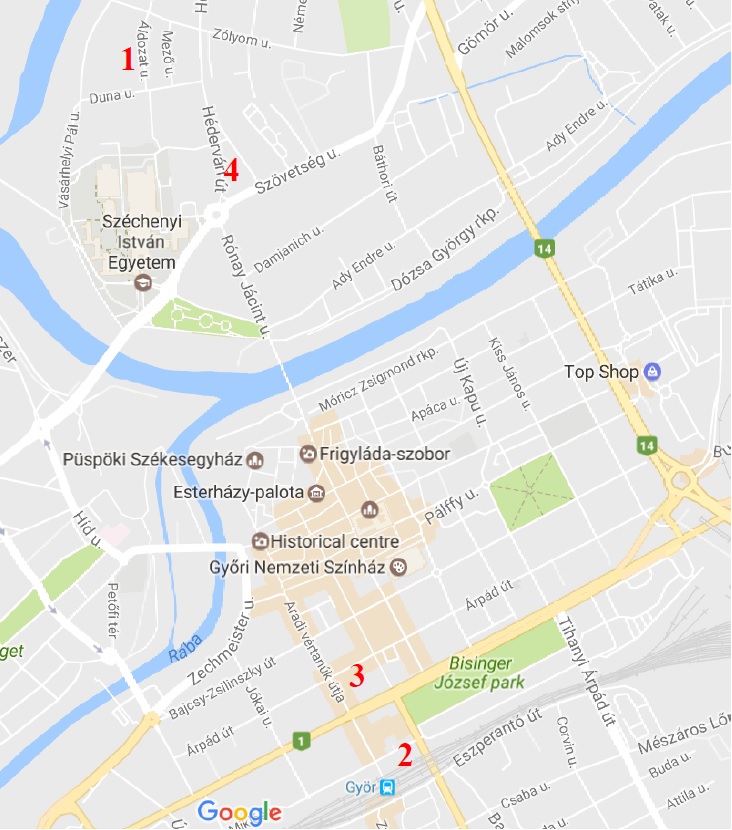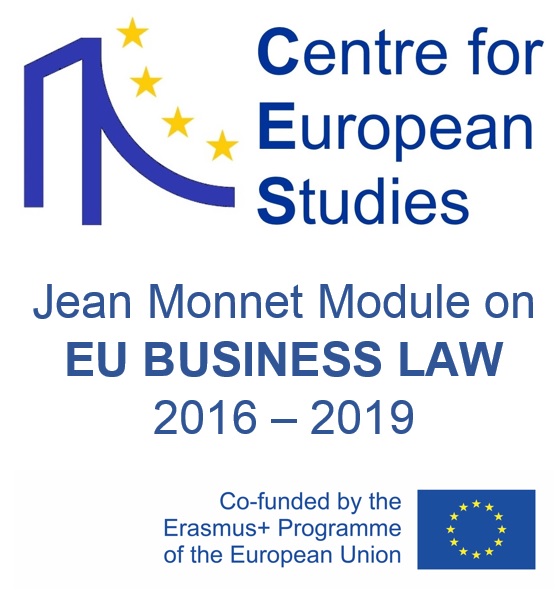Programme
Download Programme
The Influence and Effects of EU Business Law
in the Western Balkans
1st EU Business Law Forum
Programme
Széchenyi István University | Faculty of Law and Political Sciences | Centre for European Studies
15 – 16 June 2017 | Győr | Hungary
The conference is carried out within the research stream of “Jean Monnet Module on EU Business Law” (EUBLAW) funded by the Erasmus+ Programme
Invitation
The Centre for European Studies (CES) of Faculty of Law and Political Sciences of the Széchenyi István University cordially invites you to the 1st EU Business Law Forum – The Influence and Effects of EU Business Law in the Western Balkans. The Forum is part of the ‘Jean Monnet Module on EU Business Law’ (EUBLAW) project funded by the European Commission’s Erasmus+ Programme in the Period of 2016 – 2019.
Concept and background
15 years ago, the Copenhagen European Council closed not only the first phase of the accession of the Central and Eastern European countries, but the Member States opened also a wide window on the future of Western Balkans and laid down the stabilisation and association policy objectives of the European Union towards the countries of the region. The Conclusions of the European Council meeting held in December 2002 confirmed the status of the Western Balkan countries as potential candidates and emphasised its determination to support the efforts of these countries to move closer to the European Union. The Thessaloniki Agenda for the Western Balkans, adopted one year later, assured the full support of the EU Member States to the endeavours of the region to consolidate democracy, stability and to promote economic development as well. The Agenda gave priority to further liberalisation of trade relations and urged the Western Balkan countries to accelerate the momentum of structural reforms, promote good governance and create a business environment that stimulates economic activity and foreign investment.
Today the potential candidates have a significant trade relationship with the European Union and their business environment as well as market conditions are progressively becoming more stable and transparent. At this time, the Former Yugoslav Republic of Macedonia, Montenegro and Serbia are already under negotiation for EU membership, but Albania, Bosnia and Herzegovina and Kosovo have also the prospect of joining the negotiations in the future. The accession process is enhanced also by the harmonisation of the legal orders of the potential candidate countries with the framework of the acquis of the European Union. The converging tendency of laws is specifically addressed in the approximation clauses of the Stabilisation and Association Agreements concluded by the Western Balkan countries with the European Union. These standard clauses require the candidate countries to make their existing and future legislation gradually compatible to the EU law and to ensure the proper implementation of these norms.
The main purpose of the Forum is to identify the relevant aspects of this process and shed light on its legal, political, economic and social implications. The sessions are devoted to discover specifically the national implementation and certain external aspects of EU Internal Market Law, questions related to dispute resolution models and financing issues of EU commercial transactions.
Programme
15th June 2017 (Thursday)
Venue: Révész Hotel
16:00–16:30 Registration
16:30–16:40 Welcome
László Milassin (head of Centre for European Studies)
16:40–18:00 Doing Business in the Central Eastern European and Western Balkan Countries – Facts and Challenges
Round-table discussion with András M. Horváth (attorney at law, associate at Kajtár Takács Hegymegi-Barakonyi Baker & McKenzie, Budapest); Csaba Pigler (attorney at law, partner at Nagy & Trócsányi, Budapest); Imre Szakács (head of Rábaköz Area, Chamber of Commerce and Industry for Győr-Moson-Sopron County)
Chair: László Milassin (head of Centre for European Studies)
18:00– Dinner reception
16th June 2017 (Friday)
8:30–9:30 Registration
9:30–9:40 Opening Address
Judit Fazekas Lévayné (Dean, Széchenyi István University, Faculty of Law and Political Sciences, Győr, Hungary)
Plenary session
Venue: Deák Ferenc Room
Chair: Balázs Horváthy (associate professor, Széchenyi István University, Faculty of Law and Political Sciences, Győr, Hungary)
9:40–10:15 Transitional reforms in the Balkans. Why Great Hopes turned to a Bleak Future? - Abstract
Marko Babić (assistant professor, University of Warsaw, Institute of European Studies, Poland)
10:15–10:40 Implementation of EU Internal Market Law in the Western Balkans - Abstract
Dragan Gajin (attorney at law, Beograd, Serbia)
10:40–11:05 The challenges of free movement of persons in the Western Balkan context - Abstract
Éva Lukács Gellérné (senior lecturer, ELTE Faculty of Law, Budapest, Hungary)
11:05–11:30 Discussion – End of plenary session
11:30–12:30 Lunch
Research session 1
12:30–14:30
Panel 1.1 – The EU Internal Market from national perspectives
Venue: S3 seminar room
Chair: Balázs Horváthy (associate professor, Széchenyi István University, Faculty of Law and Political Sciences, Győr, Hungary)
- Serbian state-owned enterprises – Necessity of corporatisation and the new role of the state as the founder - Abstract
Sonja Buncic (full professor, University of Novi Sad, Faculty of Technical Sciences, Novi Sad, Serbia)
- Some considerations regarding the relationship between the EU competition policy and the proper functioning of the EU internal market from the perspective of Eastern European countries - Abstract
Ioan Lazar (associate professor, “1 Decembrie 1918” University, Faculty of Law and Social Sciences, Alba-Iulia, Romania)
- Hungary and the single European market - Abstract
Dezső Tamás Ziegler (research fellow, HAS CSS Institute for Legal Studies, Budapest, Hungary)
- Compatibility of legislation in Bosnia and Herzegovina with EU law in the field of intellectual property rights as a subject of foreign direct investment - Abstract
Njegoslav Jović (doctoral researcher/senior assisstant, University of Banja Luka, Faculty of Law, Banja Luka, Bosnia and Herzegovina)
- Application and Implementation of Directive 2008/48/EC in the Slovak Legal Order - Abstract
Mária Patakyová (PhD student, Comenius University, Faculty of Law, Bratislava, Slovakia)
Panel 1.2 – Harmonizing the financial markets
Venue: S4 seminar room
Chair: Judit Glavanits (associate professor, head of department, Széchenyi István University, Faculty of Law and Political Sciences, Győr, Hungary)
- Insolvency proceedings of corporate groups under the new Insolvency Regulation- reflection and impacts on Croatian, Bosnian and Slovenian insolvency regulation - Abstract
Dubravka Aksamovic (Head of Department of Commercial and Company law, J.J. Strossmayer University, Faculty of Law, Osijek, Croatia); Iva Kuna (PhD candidate, J.J. Strossmayer University, Faculty of Law, Osijek, Croatia)
- New Challenges in the Field of European Insurance Law - Abstract
Attila Vermes (senior lecturer, Széchenyi István University, Faculty of Law and Political Sciences, Győr, Hungary)
- The effects and consequences of the European financial clearing system on European business practice - Abstract
Alexandra Teodora Oprea (PhD candidate, University “Alexandru Ioan Cuza”, Faculty ofLaw, Iasi, Romania)
- The inherent risks of foreign currency credits and their socio-economic impact - Abstract
Maximilian-Andrei Druță (PhD student, West University, Faculty of Law, Timișoara, Romania)
14:30–15:00 Coffee break
Research session 2
15:00-17:00
Panel 2.1 – External aspects of the EU Single Market Law
Venue: S3 seminar room
Chair: András Szegedi (associate professor, Széchenyi István University, Faculty of Law and Political Sciences, Győr, Hungary)
- Multilateralising ISDS? – The new ambition of the European Commission - Abstract
Balázs Horváthy (associate professor, Széchenyi István University, Faculty of Law and Political Sciences, Győr, Hungary)
- Free trade agreements and the legal personality of the EU - Abstract
László Knapp (assistant lecturer, Széchenyi István University, Faculty of Law and Political Sciences, Győr, Hungary)
- How Brexit affects free movement of West Balkans' employees? Labour Mobility in the context of withdrawal - Abstract
Éva Nyerges (PhD student, Széchenyi István University, Faculty of Law and Political Sciences, Győr, Hungary)
- Accounting regulations in the USA and in the European Union and their impact on the Western Balkans - Abstract
Patrik Hancz (PhD student, Széchenyi István University, Faculty of Law and Political Sciences, Győr, Hungary)
Panel 2.2 – New directions of dispute settlements
Venue: S4 seminar room
Chair: László Milassin (associate professor, Széchenyi István University, Faculty of Law and Political Sciences, Győr, Hungary)
- Romania’s Alternative Dispute Resolution Centre for the Banking System: Turning a Good Theory into a Bad Practice? - Abstract
Florina Popa (lecturer, Faculty of Law, West University of Timişoara, Romania); Dan-Adrian Cărămidariu (research assistant, Faculty of Law, West University of Timişoara, Romania)
- Effects of EU directives on national public procurement regulation - Abstract
Judit Glavanits (associate professor, head of department, Széchenyi István University, Faculty of Law and Political Sciences, Győr, Hungary)
- General aspects regarding alternative dispute resolution mechanism in EU competition law - Abstract
Laura Lazar (teaching assistant, “Babeș-Bolyai” University, Faculty of Law, Cluj-Napoca, Romania)
- Online dispute resolution in international practice - Abstract
Erika Rigó (PhD student, Széchenyi István University, Faculty of Law and Political Sciences, Győr, Hungary)
17:00–17:15 Closing remarks
17:15 End of conference
Contact and information
All questions and inquiries regarding the 1st EU Business Law Forum should be sent to ces@sze.hu , the Committee makes every effort to respond all questions as soon as possible.
Locations
The Forum will be carried out within the premises of the Faculty of Law and Political Sciences of Széchenyi István University (H-9026 Győr, Áldozat u. 12, No. 1. on the map). The University is located in the northern part of the town, within easy walking distance of the city centre.
You can access the Faculty from the train station (No. 2)
- by local bus lines 11, 19 and 29 from the bus stop “Aradi vertanúk útja” (No. 3) to “Széchenyi István Egyetem” (No. 4). Tickets are available in ticket machines for 230 HUF (cash and credit cards are accepted).
- by taxi (estimated fare: 1200-1600 HUF)
- by walk (approx. 20-25 minutes).
The events of 15th June (Thursday) are hosted by the Révész Hotel (H-9026 Győr, Hédervári út 22., No. 5) The Hotel is easily accessible from the Faculty by a 3-minute walk. The second day of the conference will be held at the Faculty.
WIFI internet access will be available in the conference venues. The participants will be invited to dinner reception on 15th June at the Révész Hotel and to lunch reception on 16th June at the Faculty.
More information on the Faculty and Győr is available at http://dfk.sze.hu/en_GB/home and http://turizmus.gyor.hu/lang/en/ .




